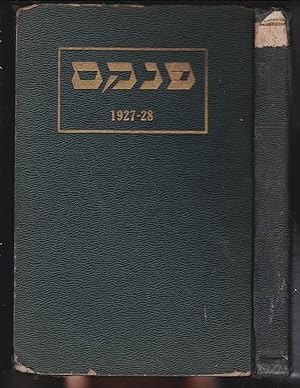shatzky jacob 1956 (2 résultats)
Type d'article
- Tous les types d'articles
- Livres (2)
- Magazines & Périodiques
- Bandes dessinées
- Partitions de musique
- Art, Affiches et Gravures
- Photographies
- Cartes
-
Manuscrits &
Papiers anciens
Etat
Reliure
- Toutes
- Couverture rigide
- Couverture souple
Particularités
- Edition originale
- Signé
- Jaquette
- Avec images
- Sans impression à la demande (1)
Pays
Evaluation du vendeur
-
Spinoza bukh / Jacob Shatzky. (1927) [LeatherBound]
Date d'édition : 2022
Vendeur : S N Books World, Delhi, Inde
Livre impression à la demande
LeatherBound. Etat : New. Leatherbound edition. Condition: New. Leather Binding on Spine and Corners with Golden leaf printing on spine. Bound in genuine leather with Satin ribbon page markers and Spine with raised gilt bands. A perfect gift for your loved ones. Reprinted from 1927 edition. NO changes have been made to the original text. This is NOT a retyped or an ocr'd reprint. Illustrations, Index, if any, are included in black and white. Each page is checked manually before printing. As this print on demand book is reprinted from a very old book, there could be some missing or flawed pages, but we always try to make the book as complete as possible. Fold-outs, if any, are not part of the book. If the original book was published in multiple volumes then this reprint is of only one volume, not the whole set. IF YOU WISH TO ORDER PARTICULAR VOLUME OR ALL THE VOLUMES YOU CAN CONTACT US. Resized as per current standards. Sewing binding for longer life, where the book block is actually sewn (smythe sewn/section sewn) with thread before binding which results in a more durable type of binding. Pages: 254 Language: yid Pages: 254.
-
Pinkes : a fertlyorik?er zshurnal far Yidisher literaturgeshikhte, shprakhforshung, folklor un bibliografiye
Edité par ?Yidishn V?isnshaftlekhn Institut Amerikaner sektsiye, New York, 1928
Vendeur : Meir Turner, New York, NY, Etats-Unis
Livre
Hardcover. Etat : Very Good. No Jacket. In Yiddish. Possibly all published. (2), 400 pages. 168 x 182 m. illustrations, portraits, music, facsimiles. \Jacob Shatzky (also: Yaakov, or Yankev Shatski; in Polish: Szacki) (1893?1956) was a distinguished Jewish historian. Shatzky was born in Warsaw. He received a traditional Jewish education and went on to study at universities in Lwów, Vienna, Berlin and Warsaw. He earned his Ph.D. from the University of Warsaw in 1922 with a thesis on "The Jewish Question in the Kingdom of Poland During the Paskiewicz Era." Historians who studied under Shatzky include Lucy Dawidowicz. Shatzky enlisted in Pilsudski's Legion and fought with distinction in the First World War; he was promoted to the rank of lieutenant. He was sent by the Polish Foreign Ministry in 1918 to report on a pogrom in Vilna. He resigned from his post when it became clear that the government would not act to punish the perpetrators of the pogroms. Shatzky emigrated to the United States in 1923. He served as Chief Librarian of the New York State Psychiatric Institute from 1930 to 1956. He acquired a portion of Sigmund Freud's library for the institute's collection. The Freud Library came to New York in the wake of Freud's departure from Vienna after the 1938 Anschluss. Unable to take his entire library of c. 1,000 books with him to London, he gave about a third of it to a friend, Paul Sonnenfeld, who soon thereafter also fled Austria. Before leaving Vienna, Sonnenfeld sold the books to the antiquarian bookdealer, Heinrich Hinterberger. In July 1939 Hinterberger issued a catalog in English, offering for sale a library [of c. 770 books) discreetly described as the creation of "a famous Viennese scientific explorer." When Dr. Jacob Shatzky, the librarian of the New York State Psychiatric Institute, received the catalog he deduced that the collection was Freud's. He convinced the Director of the Institute, Dr. Nolan D.C. Lewis, to purchase the library for about $500, pledging to cover the price out of his own pocket if the books turned out not to be Freud's. When the books arrived in New York in September 1939, legend has it that the first volume Shatzky and Lewis pulled from the packing crate was the copy of Jean-Martin Charot's collected works inscribed by Charcot to his former student Freud. With funding from pioneer American psychoanalyst, Abraham Brill, the library was housed in a specially constructed Freud Room in the Psychiatric Institute Library. The Freud Library remained there until 1978, when it was transferred to Archives & Special Collections on a long-term loan basis. The Freud Library remains the property of the New York State Psychiatric Institute.


![Image du vendeur pour Spinoza bukh / Jacob Shatzky. (1927) [LeatherBound] mis en vente par S N Books World](https://pictures.abebooks.com/inventory/md/md31650088186.jpg)
